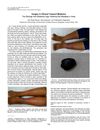 November 2021 in “American Journal of Tropical Medicine and Hygiene”
November 2021 in “American Journal of Tropical Medicine and Hygiene” Marking nuts can cause skin irritation and allergies.
October 2021 in “The journal of investigative dermatology/Journal of investigative dermatology” Herpes simplex virus infections should be considered in pemphigus patients to avoid unnecessary changes in treatment.
October 2021 in “European journal of cancer” Repeated biopsies are crucial for managing lupus panniculitis when initial treatments fail.
[object Object] 
Kerion is a rare but serious scalp infection that needs proper treatment.

A TNFAIP3 gene mutation can cause unusual and varied symptoms of lupus and Sjogren's syndrome.
 10 citations,
June 2000 in “Primary Care”
10 citations,
June 2000 in “Primary Care” The document explains different hair loss types and treatments, emphasizing diagnosis through examination and tests, and specific treatments for each condition.
 4 citations,
June 2002 in “Clinical and experimental dermatology”
4 citations,
June 2002 in “Clinical and experimental dermatology” Effective treatment for hidradenitis suppurativa varies, with antibiotics commonly used and surgery as an option, but no single method is universally successful.
[object Object]  164 citations,
April 2008 in “Cochrane library”
164 citations,
April 2008 in “Cochrane library” Current treatments for alopecia show no significant long-term benefits.
 9 citations,
August 2002 in “Current Opinion in Pediatrics”
9 citations,
August 2002 in “Current Opinion in Pediatrics” An 18-year-old girl with pemphigus vulgaris needed strong medication and careful treatment due to ineffective initial therapies and side effects.
 July 2003 in “Journal of Cutaneous Medicine and Surgery”
July 2003 in “Journal of Cutaneous Medicine and Surgery” Certain drugs can cause skin lupus, but stopping the drug usually helps. Vaccines work against smallpox, genital herpes, and a type of human papillomavirus. More frequent light therapy clears psoriasis faster. Certain treatments work for psoriasis and dermatitis. A specific cream effectively treats a type of skin cancer. Low iron levels aren't directly linked to chronic hair loss.
 32 citations,
June 2003 in “The American Journal of Dermatopathology”
32 citations,
June 2003 in “The American Journal of Dermatopathology” Lipedematous scalp is mainly caused by an increase in fat tissue under the skin and is different from lipedematous alopecia.
17 citations,
June 2016 in “Archives de Pédiatrie” Frontal fibrosing alopecia can occur in children, not just postmenopausal women.
 July 2023 in “The Journal of Family Practice”
July 2023 in “The Journal of Family Practice” The man was diagnosed with lupus and improved with treatment.
 September 2016 in “Medical Journal of Australia”
September 2016 in “Medical Journal of Australia” Planting trees and doing yoga might make you feel better; yoga can help with asthma symptoms, and certain treatments can improve female hair loss.
 July 2003 in “Journal of Cutaneous Medicine and Surgery”
July 2003 in “Journal of Cutaneous Medicine and Surgery” Blood pressure drugs can cause skin lupus, but it improves after stopping the drug. The glycoprotein D vaccine works against genital herpes in some women, and the HPV-16 vaccine reduces HPV-16 infection and related diseases. More frequent light therapy clears psoriasis faster. A cream called imiquimod effectively treats a type of skin cancer. Iron supplements don't necessarily help with chronic hair loss in women.
 28 citations,
October 1978 in “Archives of dermatology”
28 citations,
October 1978 in “Archives of dermatology” Corticosteroids may effectively regrow hair in Alopecia Totalis with manageable side effects.
 22 citations,
April 2000 in “International Journal of Dermatology”
22 citations,
April 2000 in “International Journal of Dermatology” A 78-year-old farmer with lung disease had skin lesions from a fungal infection that healed completely with medication.
 11 citations,
November 2019 in “Clinical Case Reports”
11 citations,
November 2019 in “Clinical Case Reports” A Brazilian teenager with severe hair loss had total hair regrowth with no side effects after using tofacitinib.
 8 citations,
October 2018 in “Journal of The American Academy of Dermatology”
8 citations,
October 2018 in “Journal of The American Academy of Dermatology” The review suggests there's no agreed treatment for Frontal Fibrosing Alopecia, but hydroxychloroquine and 5a-reductase inhibitors are most effective. New treatments like platelet-rich plasma and LED light could help if standard treatments fail.
 3 citations,
January 2016 in “Skin appendage disorders”
3 citations,
January 2016 in “Skin appendage disorders” Possible causes of female hair loss include androgenetic alopecia, telogen effluvium, cicatricial alopecia, and alopecia areata incognita; diagnosis and treatment require dermoscopy and histopathology.
 2 citations,
October 2016
2 citations,
October 2016 Chemotherapy and radiotherapy can cause skin side effects like rashes, hair loss, and nail changes, which are usually managed with conservative treatments.
 33 citations,
August 2006 in “Journal der Deutschen Dermatologischen Gesellschaft”
33 citations,
August 2006 in “Journal der Deutschen Dermatologischen Gesellschaft” Pregnancy can cause specific skin conditions that need correct diagnosis and treatment to protect both mother and baby.
 2 citations,
January 2023 in “Journal of Dermatology”
2 citations,
January 2023 in “Journal of Dermatology” Some types of hair loss can continue for a long time after recovering from a severe drug reaction known as DRESS.
 14 citations,
March 2007 in “Pediatric pulmonology”
14 citations,
March 2007 in “Pediatric pulmonology” Inhaled steroids in children may cause excessive hair growth and not always go away after stopping the medication.
 1 citations,
August 2005 in “British Journal of Dermatology”
1 citations,
August 2005 in “British Journal of Dermatology” Accidentally eating a topical steroid may rarely cause acute generalized pustular psoriasis.
 44 citations,
October 2017 in “Journal of the American Academy of Dermatology”
44 citations,
October 2017 in “Journal of the American Academy of Dermatology” Tofacitinib is effective and safe for treating severe hair loss in Korean patients.
 41 citations,
February 1970 in “Archives of Dermatology”
41 citations,
February 1970 in “Archives of Dermatology” Oral contraceptives can cause skin issues like dark patches, acne, yeast infections, sensitivity to light, spider veins, skin rashes, and hair loss.
 11 citations,
February 2021 in “Journal of Cosmetic Dermatology”
11 citations,
February 2021 in “Journal of Cosmetic Dermatology” Oral tofacitinib helped regrow hair in over half of the patients with severe alopecia, but relapses and side effects were common.
 11 citations,
January 2018 in “Acta dermato-venereologica”
11 citations,
January 2018 in “Acta dermato-venereologica” Tofacitinib works better and is more tolerable for severe alopecia than conventional treatments and DPCP immunotherapy.
 80 citations,
August 1991 in “The journal of allergy and clinical immunology/Journal of allergy and clinical immunology/The journal of allergy and clinical immunology”
80 citations,
August 1991 in “The journal of allergy and clinical immunology/Journal of allergy and clinical immunology/The journal of allergy and clinical immunology” Methotrexate reduced the need for steroids in asthma patients without worsening their condition.



























